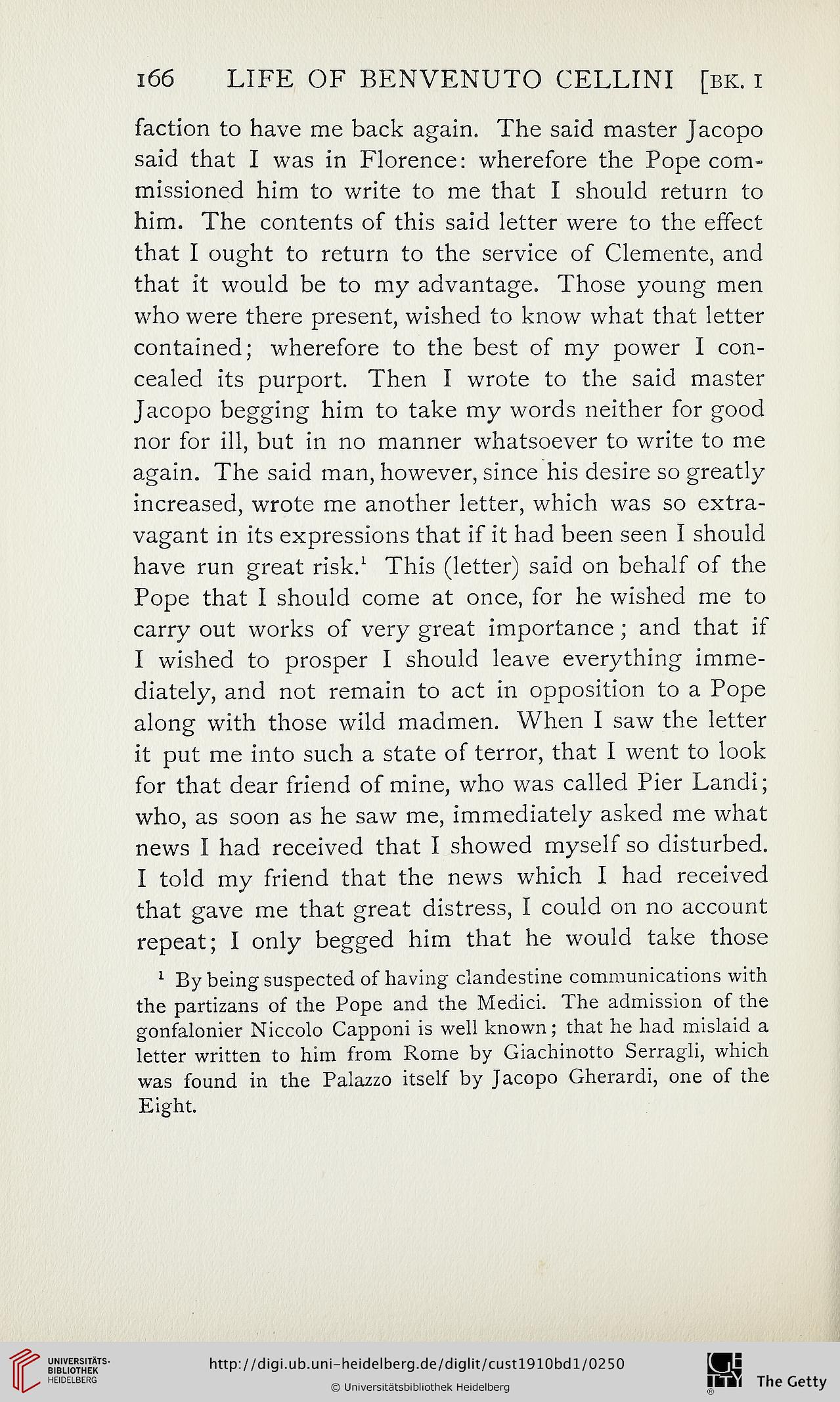166 LIFE OF BENVENUTO CELLINI [BK. i
faction to have me back again. The said master Jacopo
said that I was in Florence: wherefore the Pope com-
missioned him to write to me that I should return to
him. The contents of this said letter were to the effect
that I ought to return to the service of Clemente, and
that it would be to my advantage. Those young men
who were there present, wished to know what that letter
contained; wherefore to the best of my power I con-
cealed its purport. Then I wrote to the said master
Jacopo begging him to take my words neither for good
nor for ill, but in no manner whatsoever to write to me
again. The said man, however, since his desire so greatly
increased, wrote me another letter, which was so extra-
vagant in its expressions that if it had been seen I should
have run great risk/ This (letter) said on behalf of the
Pope that I should come at once, for he wished me to
carry out works of very great importance ; and that if
I wished to prosper I should leave everything imme-
diately, and not remain to act in opposition to a Pope
along with those wild madmen. When I saw the letter
it put me into such a state of terror, that I went to look
for that dear friend of mine, who was called Pier Landi;
who, as soon as he saw me, immediately asked me what
news I had received that I showed myself so disturbed.
I told my friend that the news which I had received
that gave me that great distress, I could on no account
repeat; I only begged him that he would take those
^ By being suspected of having clandestine communications with
the partizans of the Pope and the Medici. The admission of the
gonfalonier Niccolo Capponi is well known; that he had mislaid a
letter written to him from Rome by Giachinotto Serragli, which
was found in the Palazzo itself by Jacopo Gherardi, one of the
Eight.
faction to have me back again. The said master Jacopo
said that I was in Florence: wherefore the Pope com-
missioned him to write to me that I should return to
him. The contents of this said letter were to the effect
that I ought to return to the service of Clemente, and
that it would be to my advantage. Those young men
who were there present, wished to know what that letter
contained; wherefore to the best of my power I con-
cealed its purport. Then I wrote to the said master
Jacopo begging him to take my words neither for good
nor for ill, but in no manner whatsoever to write to me
again. The said man, however, since his desire so greatly
increased, wrote me another letter, which was so extra-
vagant in its expressions that if it had been seen I should
have run great risk/ This (letter) said on behalf of the
Pope that I should come at once, for he wished me to
carry out works of very great importance ; and that if
I wished to prosper I should leave everything imme-
diately, and not remain to act in opposition to a Pope
along with those wild madmen. When I saw the letter
it put me into such a state of terror, that I went to look
for that dear friend of mine, who was called Pier Landi;
who, as soon as he saw me, immediately asked me what
news I had received that I showed myself so disturbed.
I told my friend that the news which I had received
that gave me that great distress, I could on no account
repeat; I only begged him that he would take those
^ By being suspected of having clandestine communications with
the partizans of the Pope and the Medici. The admission of the
gonfalonier Niccolo Capponi is well known; that he had mislaid a
letter written to him from Rome by Giachinotto Serragli, which
was found in the Palazzo itself by Jacopo Gherardi, one of the
Eight.




